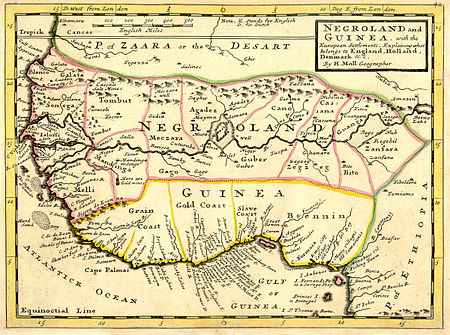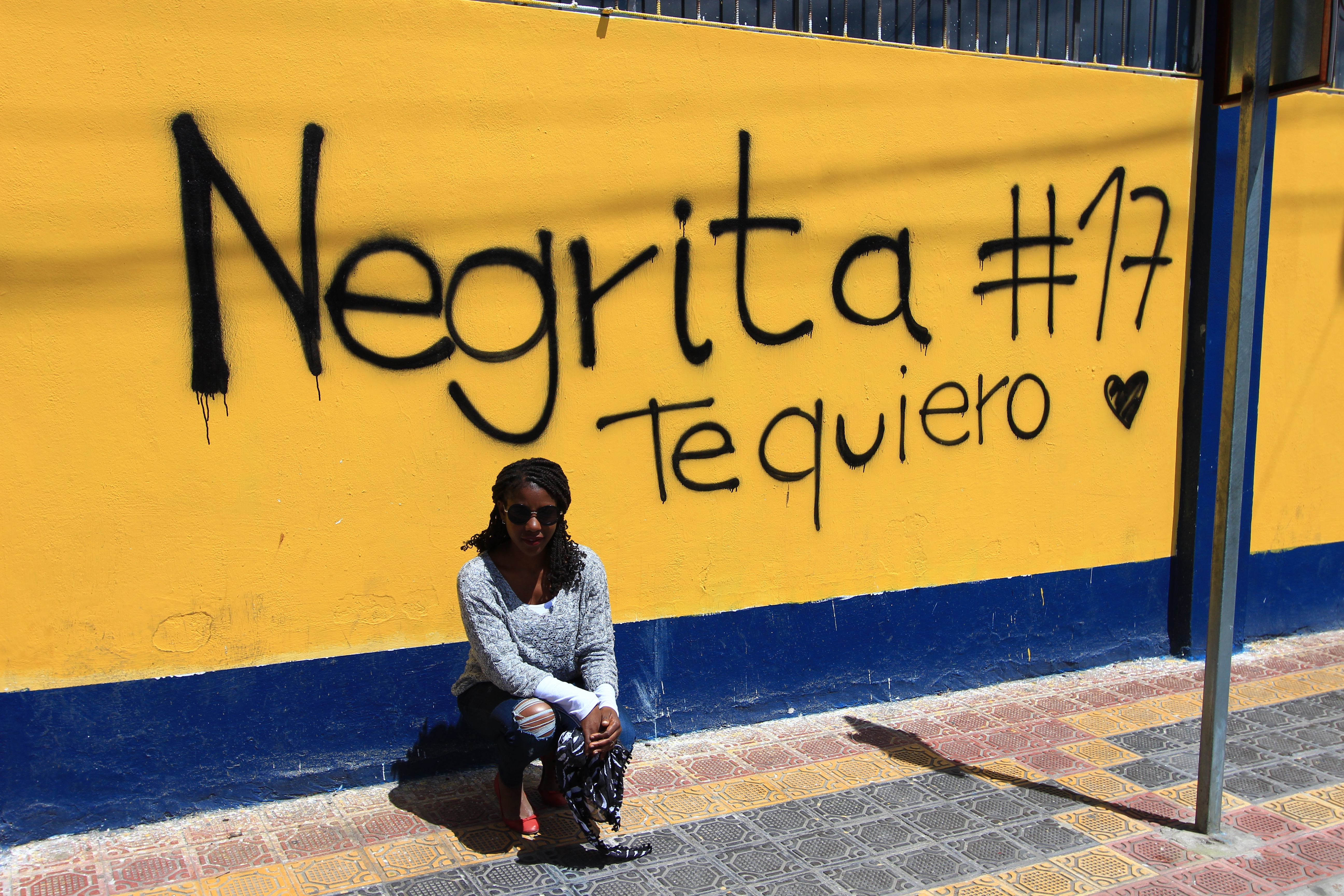Got a Panamanian vaccine that suppresses the symptoms.I thought you was reppin #c00nset tho lol
You are using an out of date browser. It may not display this or other websites correctly.
You should upgrade or use an alternative browser.
You should upgrade or use an alternative browser.
Essential The Official African American Thread#2
- Thread starter Rhapscallion Démone
- Start date
More options
Who Replied?Black Lightning
Superstar
Unforgivable Blackness: The Rise and Fall of Jack Johnson
K.O.N.Y
Superstar
what you mean brehI'm probably the most dangerous person in #AAGang right now.


what you mean breh
Taking AA gang BEYOND the Coli...
But let me PM you the rest.
IllmaticDelta
Veteran
the castaways the exiles that became the tribe of gawds&goats*

IllmaticDelta
Veteran
to add to that
In English

A European map of West Africa, 1736. Included is the archaic mapping designation of Negroland.

"Negro" was once an acceptable term. All-Negro Comics was a 1947 comic anthology written by African-American writers and featuring black characters.
Around 1442, the Portuguese first arrived in Southern Africa while trying to find a sea route to India. The term negro, literally meaning 'black', was used by the Spanish and Portuguese as a simple description to refer to the Bantu peoples that they encountered. From the 18th century to the late 1960s, negro (later capitalized) was considered to be the proper English-language term for people of black African origin.
United States
Negro superseded colored as the most polite word for African Americans at a time when black was considered more offensive.[3] This word was accepted as normal, including by people classified as Negroes, until the late 1960s, after the later African-American Civil Rights Movement. One well-known example is the identification by Martin Luther King, Jr. of his own race as "Negro" in his famous speech of 1963, "I Have a Dream".
During the civil rights movements era of the 1950s and 1960s, some black American leaders in the United States, notably Malcolm X, objected to the word Negro because they associated it with the long history of slavery, segregation, and discrimination that treated African Americans as second class citizens, or worse.[4] Malcolm X preferred Black to Negro, but also started using the term Afro-American after leaving the Nation of Islam.[5]
Since the late 1960s, various other terms have been more widespread in popular usage. These include black, Black African, Afro-American (in use from the late 1960s to 1990) and African American (used in the United States to refer to black Americans, people often referred to in the past as American Negroes).[6]
The term Negro is still used in some historical contexts, such as in the name of the United Negro College Fund[7][8] and the Negro league in sports.
The United States Census Bureau announced that Negro would be included on the 2010 United States Census, alongside Black and African-American, because some older black Americans still self-identify with the term.[9][10][11]
The word Negro fell out of favor by the early 1970s in the United States after the African-American Civil Rights Movement. However, many older African Americans initially found the term black more offensive than Negro. In current English language usage, Negro is generally considered to be acceptable in a historical context, such as Negro spirituals or baseball's Negro Leagues of the early and mid-20th century, or in the name of older organizations, as in the United Negro College Fund or the Journal of Negro Education. The U.S. Census now uses the grouping "Black, African-American, or Negro." Negro is used in efforts to include older African Americans who more closely associate with the term.[12] According to Oxford Dictionaries, use of the word "now seems out of date or even offensive in both British and US English".[13]
A specifically female form of the word, negress (sometimes capitalized), was occasionally used. However, like Jewess, it has all but completely fallen from use. The related word Negroid was used by 19th- and 20th-century racial anthropologists. The suffix -oid means "similar to". "Negroid" as a noun was used to designate a wider or more generalized category than Negro; as an adjective it qualified a noun as in, for example, "negroid features".[14]
First used in the census in 1900, “Negro” became the most common way of referring to black Americans through most of the early 20th century, during a time of racial inequality and segregation. “Negro” itself had taken the place of “colored.” Starting with the 1960s civil rights movement, black activists began to reject the “Negro” label and came to identify themselves as black or African-American.
http://nypost.com/2013/02/25/census-to-replace-negro-with-black-or-african-american/


.
.
What's In a Name?
Negro vs. Afro-American vs. Black
Are there substantial grounds for the violent opposition to the word "Negro"?
To answer these questions and to relate them to the whole bubbling controversy, one must go back 400 years. For Americans of African descent have been arguing about names ever since they were forcibly transported from Africa by Europeans who arbitrarily branded them "Blackamoors," "Moors," "negers," and "negros." The English word "Negro" is a derivative of the Spanish and Portuguese word negro, which means black. The Portuguese and Spanish, who were pioneers in the African Slave Trade, used this adjective to designate the African men and women whom they captured and transported to the slave mart of the New World. Within a short time, the Portuguese word negro (no capital) became the English noun-adjective "negro." This word, which was not capitalized at first, fused not only humanity, nationality and place of origin but also certain white judgements about the inherent and irredeemable inferiority of the persons so designated The word also referred to certain Jim Crow places, i.e., the "negro pew" in Christian churches.
Although the word "Negro" became a generally acceptable designation in the l930s, there was strong opposition from militant radicals like Adam Clayton Powell, who continued to use the word "black," and from militant nationalists like Elijah Muhammad, who continued to speak of "so-called Negroes." This opposition, inchoate and unorganized, was sharpened in the '50s and '60s by the rhetorical artistry of Malcolm X and the emergence of the Black Power movement. But MalcoIm X and the Black Power movement were reflections of a general crisis of identity which is similar in tone and urgency to the crises of the 19th century and the first decades of the 20th.
It appears, from this short historical sketch, that the word "Negro" has been a generally acceptable term in the black or, if you prefer, the Negro community for relatively short time. It appears also that there has been continuous and sustained opposition to the term. Contemporary critics of the word "Negro" say Booker T. Washington was primarily responsible for the campaign in which the word "Negro" supplanted the the words "black," "colored," and "Afro-American." There is truth in this -- the Negro Year Book and the Negro Business League were Washington projects -- but it is not the whole truth. The movement for adoption of the word "Negro" was also given a strong impetus by militant radicals like W. E. B. Du Bois, who was one of the founders of the American Negro Academy, and militant nationalists like Marcus Garvey, who used the word "Negro" consistently and named his organization the Universal Negro Improvement Association.
Baird objects to the word "Negro" on two grounds. 1) The word "Negro" is a slave-oriented epithet which was imposed on Americans of African descent by slavemasters. "The word came into use," Baird says, "in connection with the enslavement of the African in the New World. The use of the word became connected with what Earl Conrad has so well called the "Negro-Concept," that grotesque conception of the African which has been shaped in the mind of the European and forced with Procrustean cruelty on the person and personality of the black American."
2) The word "Negro" is not geographically or culturally specific. Baird denies that the English word "Negro" is a synonym for black. He says. "'Negro' does not mean simply 'black,' which would be the simple, direct opposite of 'white.' We talk about a 'white man' or a 'white Cadillac'; we may talk, as many unfortunately do, of a 'Negro man,' but never of a 'Negro Cadillac.'
Bennett, What's In a Name? Negro vs. Afro-American vs. Black (1967)
.
.
Culture clash: When he called me Negrita


I was living in Mexico the first time I heard the term “negrita”. I was practicing my nascent Spanish with a new Mexican friend. This exercise was great for my shaky language skills but mentally exhausting– my head ached from trying to piece together meaning from his rapidly spoken words, a code coated in a thick regional accent. But when he called me negrita I heard and understood the word with exceptional clarity and was unsure of whether or not I was supposed to be offended. It sounded awfully close to the N-word, too close. My context, upbringing, and cultural baggage made negrita feel like a sharp slap, a slur, a direct assault on an aspect of myself of which I am very proud. In that moment, the time when I was walking to my university campus years before and some idiot in a car screamed “******!” out their window as they drove past came flooding back; the memory of the puzzlement, anger, and humiliation I felt surfaced anew, wild and raw as the first time. But the moment passed, slow-quick like sands through the hourglass, and I came to discover that the word whose counterpart in inglés evokes so much pain is actually a term of endearment in Latin America. Or so they say.
Culture clash: When he called me Negrita - Oneika the Traveller
to add to that
http://nypost.com/2013/02/25/census-to-replace-negro-with-black-or-african-american/


.
.
What's In a Name?
Negro vs. Afro-American vs. Black
Bennett, What's In a Name? Negro vs. Afro-American vs. Black (1967)
.
.
Culture clash: When he called me Negrita - Oneika the Traveller
You right on time breh, something happened very recently In TLR that had me conflicted about the word Negro. It's definitely an outdated term and depending on the context it is used I also feel it can be derogatory.
K.Dot
African American
WOWthe castaways the exiles that became the tribe of gawds&goats*



IllmaticDelta
Veteran
You right on time breh, something happened very recently In TLR that had me conflicted about the word Negro. It's definitely an outdated term and depending on the context it is used I also feel it can be derogatory.
yup
Black Lightning
Superstar
Black Lightning
Superstar
Black Lightning
Superstar
Black Lightning
Superstar
 Greatest female athlete of all time
Greatest female athlete of all time

